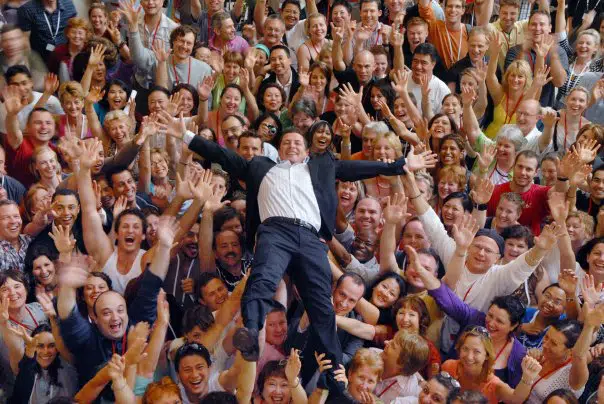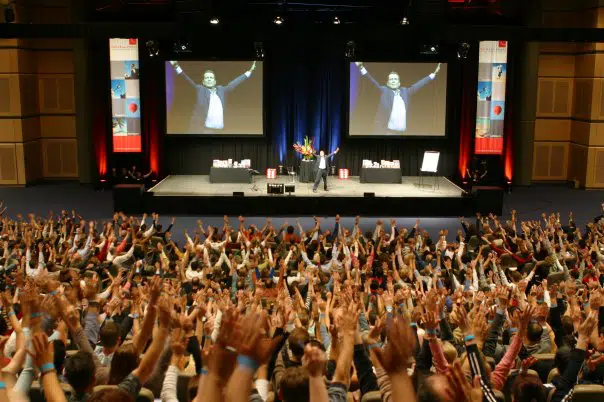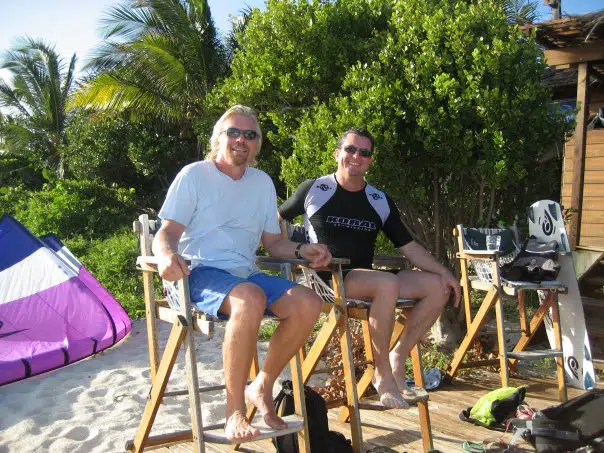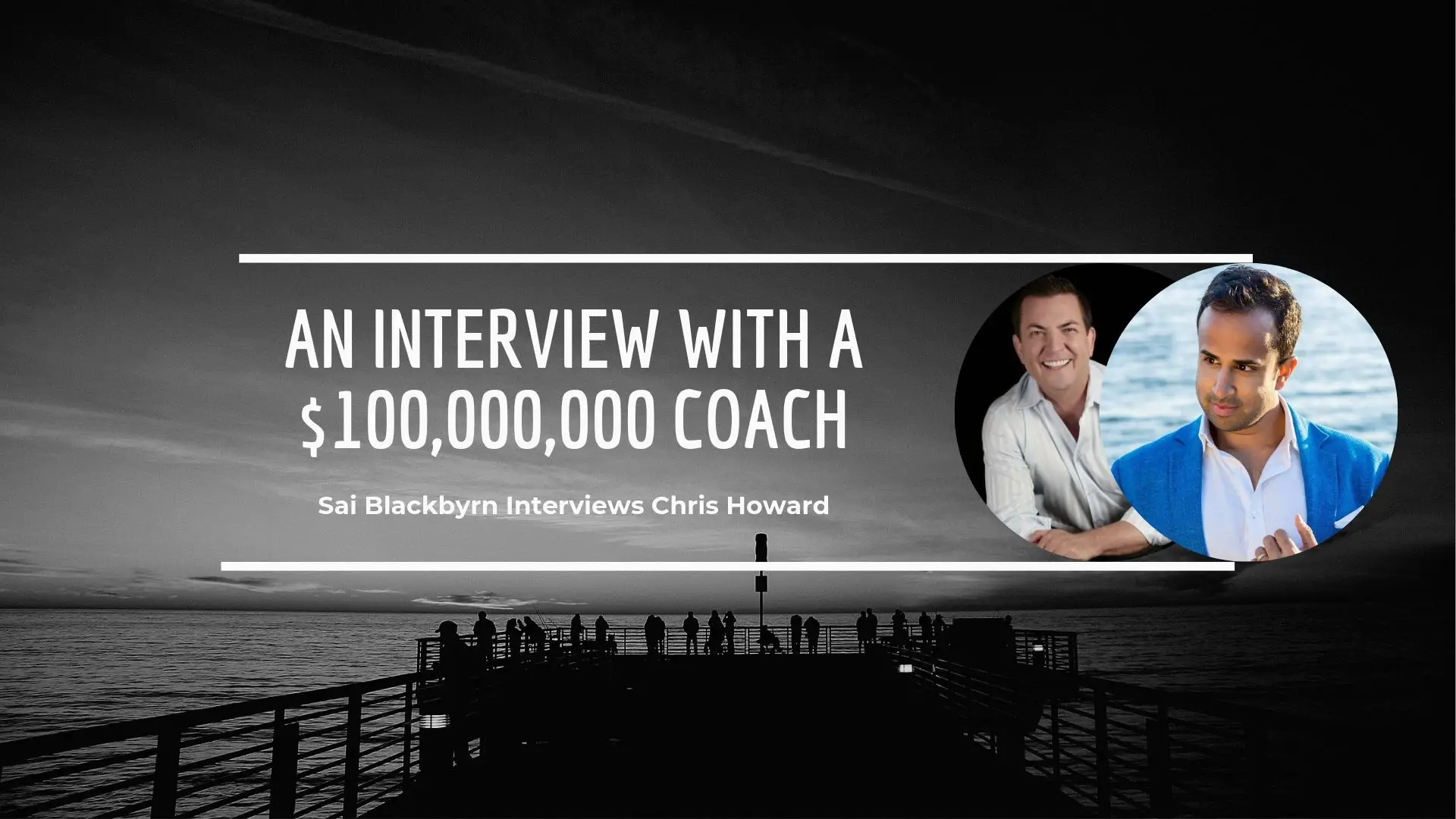In a world that’s constantly bombarding you with hate and panic-filled news, the one industry brimming with hope has been of coaching and mentoring. The industry is focused on improving individuals, communities, and even entire power structures. I was able to sit down with Chris Howard, who I happened to meet a few years ago in Bali while overcoming my own set of challenges. I’ve seen him speaking in front of thousands of people, and I’ve spoken to him one-on-one; he is equally mesmerizing and charismatic in both settings.
Chris has sold one hundred million dollars’ worth of products, he has had fully sold out arenas, and he transforms the lives of those who has ever come into one of his events. I am lucky that I was able to meet him more than once because watching him conduct his events is like watching magic in action.
Chris joined us for an interview from his ‘villa in rainforest of jungle paradise in Bali,’ and I could hear roosters and palm trees in the background. He says ‘villa’, but I know that a palace would be a more appropriate descriptor for that property.
- On getting into personal development
- On fame and audience
- On getting on the stage for the first time
- On growing his company
- On working with other gurus
- On the first event he ever did by himself
- On getting ‘Big’
- On pressing pause
- On getting off the stage
- On getting back up
- On the present and future
- On gratitude
Note: This interview has been edited for length and clarity.
On getting into personal development
Chris got into personal development early on, and as he says, he got into it at the age of 9. His mother saw him coping with the divorce of his parents badly, so he got into transcendental meditation, clinical hypnosis, karate, and more to manage his emotions better. He has since then mastered Jujitsu and gotten his black belt.
He got into personal development professionally at the age of 24, after realizing that he could be doing so much more with his experience. In one of the many books on self-development he was reading, Tony Robins mentioned how anybody could take the path to learning he outlined and reap the rewards.
He ended up getting into Neuro-Linguistic Programming (NLP), hypnosis, and eventually mastering, teaching, and then speaking on these topics.
On fame and audience
Chris says,
“As a child, after the divorce of my parents, I was isolating myself. I wouldn’t talk to other kids, I would go hide in the forest during the recess, and in general, I lacked the tools to connect with the world around me.
In hindsight, I can clearly see that I didn’t feel loved and didn’t feel that I had the capability to be loved. I thought that I would find a version of that on stage. I was part of the school play when I was 14, and with the audience applause and the requests for autographs, I was hooked! Ever since then, I couldn’t wait to be back in front of a crowd, in front of a camera.”
Chris admits that it took him a long time to work through those issues and now there are different motivators for him wanting an audience, but he loves what he does.
On getting on the stage for the first time
Chris admits that not all his reasons for wanting to be on stage were altruistic. As someone who considers himself a teacher, he wanted to help people be their best self, but he admits that his reasons were personal as well. He thought that in the process of helping people, he will also discover a way to make his own life better as well.
In order to tap into all of his potentials, he knew that helping people learn all the secrets of growth was crucial.
On growing his company
After his first company Chris Howard International failed, Chris decided that he needed to learn what he was missing. After working for many personal development companies, he decided to set up his own company again. He admits that without that experience, he wouldn’t be where he is.
“Despite having all the leadership, training and mentoring experience from my time in Club Med, I would have struggled had I not gone in and learned the actual details of managing a business like the one I needed to establish.”
On working with other gurus
“It was amazing! People say I don’t want to work with/for someone else, but working for someone else is a blessing!”
Chris emphatically attributes his time working with personal growth gurus to be at the heart of what he does. He goes on to say that if he hadn’t served that time, he would never have been able to grow his own company. The mentorships allowed him to accelerate his learning not in the order of 10 times, but 100! Because he could see exactly how things are done, he could build on top of that intellectual architecture.
On the first event he ever did by himself
“By this time, I had the experience of managing an event and of being on the stage; the only difference was that this time I had to do the whole thing by myself. So, I took on a business partner with a wealth of experience and started partnering with promoters, and that gave us the growth we needed.”
Chris hit his peak when he was holding the attention of massive crowds in the UK, Australia, and America. As he remembers, there were technological failures in the early days, but he says it also allowed him to reach people directly and efficiently.
“All you need is for people to have a transformational experience, and sometimes that connection occurs when there are no slide shows, when everything else has failed, and all that is left is our ability to make a connection”
As the size of the audiences grew, Chris admits relying more heavily on technology, but he still prides himself on connecting with his audience.

On getting ‘Big’
“The good always outweighs the bad.”
Chris remembers when their company was the largest personal and professional development company in Australia. They were also #2 behind Tony Robins in London; they were pulling in 6,000 people in London. He remembers hitting million-dollar sales day after day, every day, but there were always events that didn’t work.
He remembers spending only 4 weeks in the year in his apartment; he spent the rest traveling in 2007–08. That’s when he realized that as much as he wanted to continue flying coach to use his money judicially, it was no longer smart.
“There were some really great things about it: I started traveling business class, and since I couldn’t go to Jujitsu gyms anymore, I had to call them into my hotel rooms and practice there. I could stay in rooms famous people had stayed in. I was being accosted for autographs! With this of course came the stalkers and the power struggles.
When you get that big, a lot of people only care about the money. I became a commodity, my time was a commodity, and there’s only so much time I had. People saw me as a means of making money, and in the process of that, because I didn’t stand up for myself enough, I got burned out. I was constantly on the road. At one point it was so bad that I literally wasn’t allowed to be sick. One event at that time would have millions of dollars pinned on it, and if I missed it people would lose their jobs.
I did those events, but it was certainly too much.”

On pressing pause
Chris remembers that in that time, there was of a lot of power play and money-grabbing. There were people who kept taking money out of the company without the partners realizing, and he remembers working for free for 3 years in the UK because of a promotional partner who threatened to bankrupt the company. Money was disappearing left, right, and center and Chris remembers seeing very little of the money he made for lots of people.
“I remember being on stage and being aware of all that financial responsibility and having a panic attack right on stage. I was teaching emotional mastery at that time, so it was very ironic.”
Unable to handle the long days, the fights, and the financial instability, he considered taking a break.
“I was told that I could die on that stage as far as they cared and as long as they were making their money, so I decided to stand up for myself, finally.”
He decided to step off the stage, and there was a huge backlash. He admits that he has some fault in establishing this dynamic because he was single-mindedly obsessed with his goal. He wanted to eradicate poverty on a global scale by encouraging entrepreneurship and self-starting, and he was willing to die with the cause, but when people started to take a stance against him taking a break, all for financial reasons, he had had enough.
On getting off the stage
“This was a difficult time; I had a lot of partners who had gotten very used to making easy money through me. They saw this as an ego-based and selfish move. They said that they had built me, they had made me, and that they could take me down. My partner started calling everyone I knew and started to destroy my name. I was shocked because I didn’t think people worked this way.
As soon as they could, they split the company up and started a soft-liquidation. When I checked in, they dumped all the debt on me and blamed me for all of it. They had started a character assassination.”
Chris goes on to quote The Art of War and how he understood later that his team had waged a 3-year long war on him without him realizing it. He admits that his use of sleeping pills during flying and his partying after events were character weaknesses that could have been exploited and subsequently were, but he was surprised at the scale of character assassination and all the untruths that were employed in the process.
“From my experience from all my years as a dating coach, I know that we never know how people are going to react. What was your journey after this betrayal?”
“After all this, my partner requested that I rest and recover at Betty Ford; he had some documents that he had me sign. In retrospect, it was my fault for not checking what they were; I trusted him like a father figure and gave him control of the company.
After I came back from a 30-day rest, I found that he had defaulted on his loan payments and dumped all the debt on me. He was a CFO, and my company didn’t really exist anymore. He had dissolved my company and taken all the money for himself.
I knew what was right and just, and he wanted me to work for him and pay all the debt. I quit my own company and started to see what I could do.
I realized that I could teach people to do what I did. I launched the million-dollar mastermind and started hanging out in Bali a lot.
Things were working again, and I was able to spend some time at Richard Branson’s island and I was lucky enough that he happened to be there. I spent some days with him, and all through that I was peppering the poor guy with questions.”

Chris remembers asking Richard about stress and not believing him when he replied with a succinct,
“I don’t have stress.”
Richard explained,
“There’s nothing that can happen in business that will stress me. If it came to my health or the health of my family, sure, but not the business.”
On getting back up
“I was one of the best in the business; even Tony Robins said that he watches me and only one other in this industry, and he believed that I was a hard worker. His lead trainer even called me up and said that he had never heard a bad thing about me. This was, of course, just months before the coup.
After the coup, after I was sent away at absolutely the wrong time, I realized that a lot of people besides me lost a lot in the dissolution of that company. The marketplace thought that I was responsible for bankrupting that company, so I felt responsible.
People lost trainings, and people got hurt financially. I started reaching out to people, replacing the trainings that were lost and doing the right thing. I am still doing that—still reaching out to people to see if I can pay back some of what was taken away.
Bali really helped me; the spiritual and emotional healing really helped. I worked through my issues: my inability to accept love and face conflict. I find that this connection, this fulfillment is worth all the pain and all the struggle.
Maybe I needed something that big to get where I am. I have a whole new way to approach life, to approach business, and I finally truly understand Richard and what he was saying on that island. I had to lose everything—my brand, my position in the marketplace, my reputation—but I finally understand.”
“You set up the organization called Rockhouse Global, the community is beautiful!”
“Yes, it is based around the idea of oneness. I love it here, and I love the team. We are based out of the US, but we do a lot of work in Bali. We have an internship/apprenticeship program where people come in and learn the speaking business from the inside.
I feel very fortunate to have the team that we do, and even though I don’t care if I ever step on a stage again, I am rediscovering the passion and joy for it. I end my workday at 5 now! Can you imagine? We have built yoga and transcendental meditation right into the business. I have to thank my step-father for getting me into it.
This time I am doing things differently. I am following the path I would advise other people to follow, and now I am putting myself first. I am following a healthy pattern of relationships now. It takes some confrontation and some standing up to things, but that’s necessary.”
Chris goes on to say that he thinks all that happened was a blessing in disguise because his incessant work ethic was part of his mission to feel worthy of love. He realizes that this mission would have made him work till he died on that stage—burned out and overworked. He now can grow in a better way, and he knows he is loved.
On the present and future
“We, as part of the Christopher Howard ™ Company, create good quality content, education, and entertainment programs that can change the world. Our goal is to eradicate poverty through education and entrepreneurial means, and we are in a place where we can do it my way. I can do it how I want to, without someone telling me to focus on the money. If I wanted to move in a more philanthropic direction, I could do so without anyone telling me otherwise, so I like that. I like the freedom and space, and it feels good.
I teach people how to generate wealth ethically, and I do want to do it in a way that’s sustainable. Our program ‘Your Ultimate Breakthrough’ focuses on maximizing people’s potential and making them the best possible versions of themselves. I want to focus on that and build it.
On gratitude
I do not want to say that I was a victim. I know that I was to blame for big parts of it. Now, however, I can see it as a blessing. It has taken me a while to come here, but I am here. With gratitude, I can say this to everybody involved in the journey of my life:
“I appreciate where I am and where I am going.”

